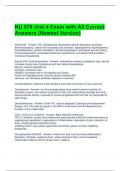NU 578 Unit 4 Exam with All Correct
Answers (Newest Version)
Steroid SE - Answer- SE: Osteoporosis (decreased calcium absorption and bone
demineralization), ulcers from increased acid secretion, hyperglycemia, hyperlipidemia,
fat predisposition, growth retardation, adrenal suppression, decreased wound healing,
immunosuppression (increased infections), hypertension, increased CNS excitation,
menstrual irregularities
Steroid DDI/ Contrainducations - Answer- Interactions related to potassium loss: steroid
increase urinary loss of potassium and can induce hypokalemia.
Digoxin: causes hypokalemia
Diuretics: potassium loss
NSAIDS: increases risk for GI bleeding and ulcers
Insulin and hypoglycemics: steroids cause increased BG
vaccines: can decrease antibody response to vaccines.
Contraindication: systemic fungi infections and those receiving live virus vaccines
Cyclosporine - Answer- an immunosuppressive drug used to prevent rejection of
transplant organs, can reduce symptoms of RA. can cause kidney damage and other
serous adverse effects. reserved for severe progressive RA that has not responded to
safer drugs.
Dexamethasone - Answer- Given PO. used to diagnose Cushing's and replacement
therapy. ALL PO meds are given in the AM to mimic boys normal release(chronic
therapy) or by a taper pack.
COX 1 and Cox 2 inhibitors - Answer- Most NSAIDS inhibit both.
COX 2: inhibition causes renal impairment and promotes mMI and stroke secondary to
suppressing vasodilation, suppression of inflammation, alleviation of pain, reduction of
fever, protect aginast colorectal cancer
Inhibiting COX1: can protect against MI and stroke, gastric errosion, bleeding
tendencies,
First generation NSAIDS - Answer- inhibit cox1 and cox2 and treat inflammatory
disorders, mild pain, suppress fever, relieve dysmenorrhea. cannot suppress
inflammation without risk for serious harm. (aspirin)
, Celecoxib - Answer- cox2 inhibitors. less effect on clothing time and GI bleed. at risk for
heart attack and stroke if discontinue.
NSAIDS - Answer- work by inhibiting cyclooxyrgenase, an enzyme necessary for
synthesis of prostaglandins and thromboxane A2. They are used to mediate pain,
inflammation, clot formation, vasoconstriction, vasodilation, platelet aggregation, fever,
integrity of gastric mucosal barrier, renal homeostasis, labor and patience of ductus
arterioles.
NSAID USE/ AE - Answer- anti-inflammatory, analgesic, antipyretic, anti platelet.
AE: gi upset, bleeding, ulceration, increased bleeding time (7-12 days with aspirin and
ibuprofen for 1) due to effects of platelets, renal effects including decreased GFR, salt
and water retention.
Aspirin DDI - Answer- anticoagulants (warfarin, hepatic), glucocorticoids, alcohol
(stomach bleeding warnings), other NSAIDS, ACEI and ARBS (impair renal function),
vaccines.
Melocicam - Answer- used for arthritis
celecoxib use - Answer- arthritis, acute pain, dysmenorrhea
selective cox 2 inhibitor. use off label for rare genetic disorder known as familial
adenomatous polyposis. no cardiovascular benefits bc does not block cox 1
AE: Gastroduodenal ulcerations, MI, stroke, renal impairment, sulfonamide allergy, don't
use in pregnancy.
Methotrexate - Answer- Reduces symptoms of RA in 80% of patients but takes 3-6
weeks to work. Works by suppressing b and t lymphocytes.
SE: hepatic fibrosis, bone marrow suppression, must monitor liver and kidney function.
DO NOT USE IN PREGNANCY
MONITOR FOR INFECTION AND FEVER. BBW FOR toxicities of bone marrow, liver,
lungs, kidneys, skin reactions.
Acute gout treatment - Answer- NSAIDS (indomethacin, naproxen), prednisone,
colchicine
Chronic gout treatment - Answer- Allopurinol, febuxostat, preobenicid, pegloticase
(given IV)
GI SIDE EFFECTS!!
Febuzostat - Answer- not recommended for patients younger than 16. expensive.
alternative to allopurinol. lowers rate levels in blood. symptoms may flare up during




